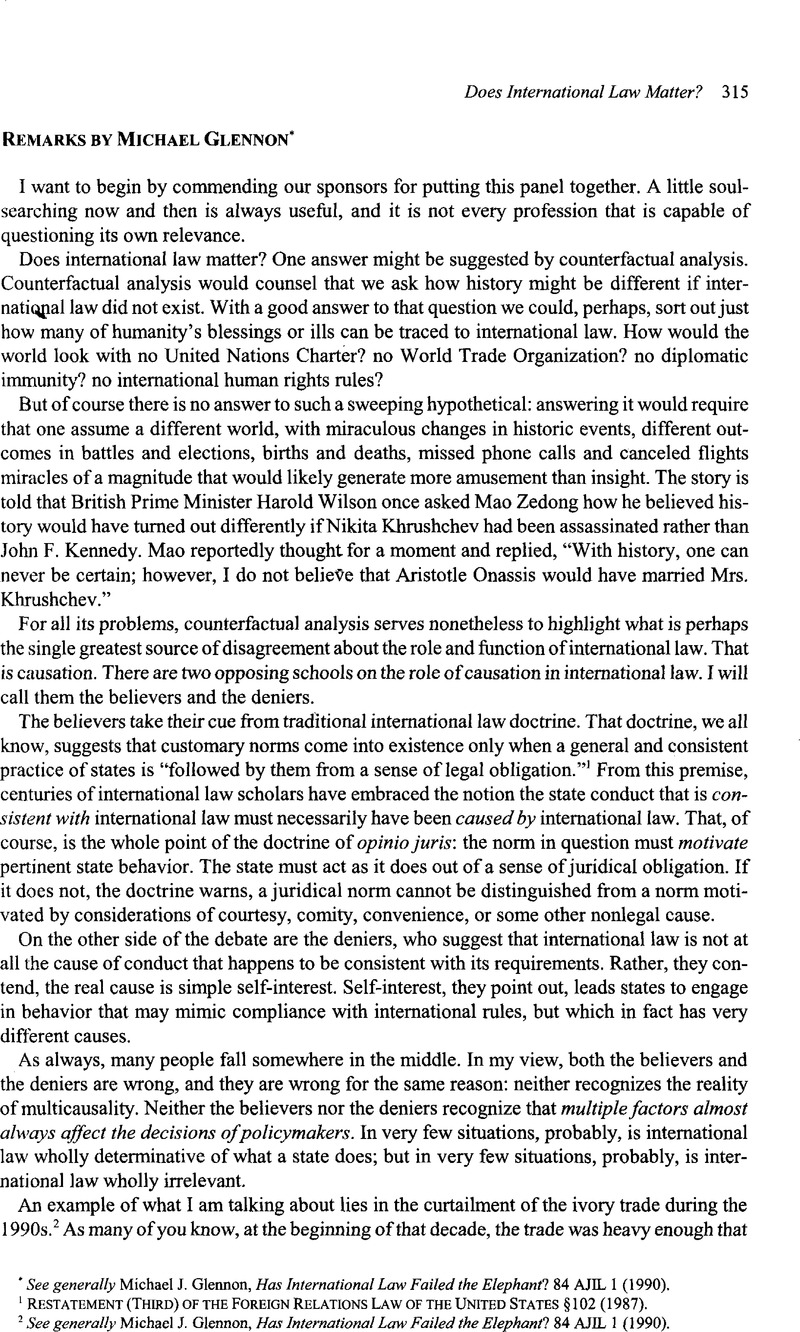Published online by Cambridge University Press: 28 February 2017

1 Restatement (Third) Of the Foreign Relations Law of the United States § 102 (1987).
2 See generally Glennon, Michael J., Has International Law Failed the Elephant! 84 AJIL 1 (1990)CrossRefGoogle Scholar.
3 See generally Robert Jervis, System Effects: Complexity in Political and Social Life (1997).
4 The process of pinpointing the tipping point is not unique to the notion of desuetude that I am here presenting; it is a core problem in the methodology of customary international law, which requires the same inquiry in determining the point at which a nascent or emerging customary norm becomes binding.
5 This succinct formulation is Professor Robert Beck’s. Robert J. Beck, “Glennon and His Critics,” Remarks at an International Studies Association Panel Discussion, Montreal (Mar. 19, 2004).
6 A treaty rule should for these purposes be analyzed no differently from a customary norm that is similarly disregarded, for the reason that all international rules are, again, subject to State consent as a condition of their effectiveness, and all international rules change as State consent changes over time. International law has no method of distinguishing between State practice that is pertinent to interpreting a customary norm and State practice that is pertinent to interpreting a treaty that incorporates the same customary norm. In each case the issue is how much weight is to be accorded State practice. So it is sensible that the interpretative methodology concerning practice should be the same in both cases. This is in fact the reason that some interpreters of Article 51 of the Charter argue that, in light of subsequent practice, that Article no longer requires an armed attack as a condition precedent to the exercise of defensive force. (I myself do not see why the juridical toboggan stopped abruptly three-fourths of the way down the hill why the same state practice of profligate use of force that has supposedly modernized Article 51 has not eviscerated Article 2(4).)
7 “Law” is not all that matters. International norms that do not qualify as law “failed” rules that fall short of the minimum-compliance tipping point can still influence State conduct. Foreign-policy decision-makers are affected by sublegal norms just as individuals in domestic systems are affected by social norms. We simply do not call them law because they are not seen as obligatory. The fact that Article 2(4) does not qualify as a binding norm does not, therefore, mean that it has no influence at all. The norm just does not seem to have enough influence to justify the conclusion that enough states accept it as binding in deed as well as word.
8 This might explain why international law matters more in some realms than in others. One such realm is security. International rales seem to have less impact on State behavior when it comes to nerve-center questions of national survival. But in other realms international law comes closer to being an independent variable, an autonomous cause of state conduct. In regulating international transportation, communication, and trade, for example, international law seems to represent a much larger slice of the causative “pie” than it does in the use-of-force regime.
9 The approach sketched out here is therefore different from that proposed by one prominent theory of legitimacy in international law, which suggests that “[e]ach rule has an inherent pull power that is independent of the circumstances in which it is exerted....” Franck, Thomas M., Legitimacy in the International System, 82 AJIL 705, at 712 (1988)CrossRefGoogle Scholar. It does not matter, in other words, how powerful the competing forces might be in any given situation; when they apply, legitimate international rules can be expected to be the only force that will affect state conduct. The theory thus posits that only factors endogenous to the rule itself induce compliance or non-compliance. My view is that factors exogenous to a rule also affect its causative impact.
10 “[T]he United Nations is not an end in itself. It is a means for building a better world. .. .” Remarks of Kofi Annan, UN Secretary General, at the World Economic Forum, Davos, Switzerland (Jan. 26, 2004), in Lexis-Nexis M2 Press Wire, Jan. 26, 2004.